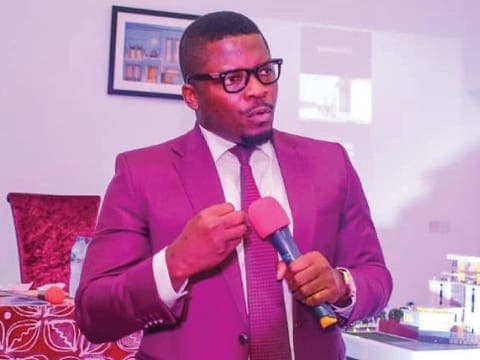Business
Sijibomi Ogundele Unveils $400m Global project

Sijibomi Ogundele unveil his $400 million first Glass Reinforced Concrete Building (GRC)
A facade full home Automation. The Age brought up Big boy, whom many have discribes as the youngest Real Estate Billionaire, SIJIBOMI OGUNDELE (SUJIMOTO) was recently seen at the Lucrezia Project Site located inside Banana island, ikoyi, Lagos State.
Our team who was at the site with him and can authoritatively report that the project is at its final stage of completion and work is in progress, the building if completed will be the first and only reinforced concrete private resident in Nigeria and Africa as a whole, an Automation Home with private IMAX cinema for residents, standard creche, indoor and virtual golf.
The easy going and soft spoken young man Sijibomi Ogundele, who had a very humble upbringing, developed the entrepreneur drive as a souvenir hawker in France, a trade he learned from his mother; doing ‘ALABARU’ a Yoruba word for cait-carrer in the popular Oke-Aro market, one of the biggest city trade zone in the whole of Africa.
From that humble beginning he learned basics of building a business enterprise, while in the trade he still have passion for education, though he didn’t attend the prestigious school like king’s college or any of the private schools of that time, but his father a public servant with John Holt could afford a public school uniform for his dearly boy, for this reason Sijibomi Ogundele determined to change the Fortune of his family; though he studied law in the long run but the spirit of entrepreneurship which his mother has imbibed in him became a dominating factor to his quest for success.
Other factor that carved/shaped his resistance is where he grow up, Agege, till date is regarded as the most populated single residential area in Lagos, populated and housing almost all the ethic groups in Nigeria, a community that can boost of producing most of the top music icons and footballer’s, model, Comedian’s and Celebrities.
Sijibomi was just 8 years old when his mother introduce him to her line of business of buying and selling, a step he developed into an entrepreneurship ideals. He started first as a motorcycle operator, with one bike popularly called ‘Okada Business’ he save the little profit and after some months he bought another one, from that singular one okada Sijibomi Ogundele bought 6 okada and that was the beginning of a multimillionaire enterprises (SUJIMOTO) a great testament to a strong business resilient and entrepreneurship Prowess.
Many of his friends discribes him as a rose flower that grows on a concrete, Mr Sijibomi Ogundele just clocked 39 years, within 5 years built a world class company, the SUJIMOTO is the must extraordinary edifice in a premium neighborhood the Banana island, in ikoyi, a building when completed and in operation will generate an annual revenue of an approximately $30 million, projectively the Sujimoto Group will be worth over $400million in the next few years.
The Multy Billion Dollar business (LorenzoBySujimito) actually started with 15 storey building, while the building is under construction a new reevaluation was proposed and the architectural drawings was restructured to accommodate 15 more storeys bringing the number to 30 storey building. With this new development LorenzoBySujimoto has been discribed as the fastest raising entrepreneurship edifice of our time.
Sijibomi Ogundele famous words “To be second is to be last; if people in their 30’s are building 5000 units annually in Asia, 75 unit’s shouldn’t scare you’ according to Mr. Ogundele “I believe in Nigeria, my passion comes from my patriotism; I believe that the Nigeria that produced the likes of MKO’s, the Dangote’s, and the Ojukwu’s also has something great in store for me”
Within 5 years Sijibomi Ogundele have developed a streem of business, which includes Sujimoto Giuliano Project, a 100% covered with travertine store fully automated. This was his first project which has in each unit a private elevator and an award-winning zaha habid bathroom from porseelanose, the idea was to set a standard luxury terrace that must compet with the quality of edifits usually of banana island; which will be able to attract client’s like MD of multinational business, billionaires and Celebrities
A stone throws from Giuliano; Sujimoto building dubbed as the tallest residential building in Banana Island – the LucreziaBySujimoto. A revolutionary building, never before seen in Nigeria or Africa! The first building with Glass Reinforced Concrete (GRC) façade, Full Home Automation, private IMAX Cinema for the residents, standard crèche, Indoor Virtual Golf with over 2,500 courses worldwide to play on, swimming pool in the sky and other exciting features. Sitting on the 12th floor is the best penthouse in Africa. A project that sets an enviable standard for luxury residential apartments in Nigeria with a sales value worth $46 and a delivery deadline of December 2021.
Image may contain: one or more people and people standing
Speaking on the Lucrezia, Mr. Ogundele made a startling revelation; “We are building the best condominium not only in Nigeria but also in Africa. The Lucrezia Penthouse comes with a private elevator, private cinema, private golf, private gym, and a private pool! The Lucrezia is very special to us because Sujimoto is divesting from Residential Projects with 80% of our real estate interest into Commercial Projects.
Business
Nigeria’s Inflation Drops to 15.10% as NBS Reports Deflationary Trend

Nigeria’s headline inflation rate declined to 15.10 per cent in January 2026, marking a significant drop from 27.61 per cent recorded in January 2025, according to the latest Consumer Price Index (CPI) report released by the National Bureau of Statistics.
The report also showed that month-on-month inflation recorded a deflationary trend of –2.88 per cent, representing a 3.42 percentage-point decrease compared to December 2025. Analysts say the development signals easing price pressures across key sectors of the economy.
Food inflation stood at 8.89 per cent year-on-year, down from 29.63 per cent in January 2025. On a month-on-month basis, food prices declined by 6.02 per cent, reflecting lower costs in several staple commodities.
The data suggests a sustained downward trajectory in inflation over the past 12 months, pointing to improving macroeconomic stability.
The administration of President Bola Ahmed Tinubu has consistently attributed recent economic adjustments to ongoing fiscal and monetary reforms aimed at stabilising prices, boosting agricultural output, and strengthening domestic supply chains.
Economic analysts note that while the latest figures indicate progress, sustaining the downward trend will depend on continued policy discipline, exchange rate stability, and improvements in food production and distribution.
The January report provides one of the clearest indications yet that inflationary pressures, which surged in early 2025, may be moderating.
Bank
Alpha Morgan to Host 19th Economic Review Webinar

Alpha Morgan to Host 19th Economic Review Webinar
In an economy shaped by constant shifts, the edge often belongs to those with the right information.
On Wednesday, February 25, 2026, Alpha Morgan Bank will host the 19th edition of its Economic Review Webinar, a high-level thought leadership session designed to equip businesses, investors, and individuals with timely financial and economic insight.
The session, which will hold live on Zoom at 10:00am WAT and will feature economist Bismarck Rewane, who will examine the key signals influencing Nigeria’s economic direction in 2026, including policy trends, market movements, and global developments shaping the local landscape.
With a consistent track record of delivering clarity in uncertain times, the Alpha Morgan Economic Review continues to provide practical context for decision-making in a dynamic environment.
Registration for the 19th Alpha Morgan Economic Review is free and can be completed via https://bit.ly/registeramerseries19
It is a bi-monthly platform that is open to the public and is held virtually.
Visit www.alphamorganbank to know more.
Business
GTBank Launches Quick Airtime Loan at 2.95%

GTBank Launches Quick Airtime Loan at 2.95%
Guaranty Trust Bank Ltd (GTBank), the flagship banking franchise of GTCO Plc, Africa’s leading financial services group, today announced the launch of Quick Airtime Loan, an innovative digital solution that gives customers instant access to airtime when they run out of call credit and have limited funds in their bank accounts, ensuring customers can stay connected when it matters most.
In today’s always-on world, running out of airtime is more than a minor inconvenience. It can mean missed opportunities, disrupted plans, and lost connections, often at the very moment when funds are tight, and options are limited. Quick Airtime Loan was created to solve this problem, offering customers instant access to airtime on credit, directly from their bank. With Quick Airtime Loan, eligible GTBank customers can access from ₦100 and up to ₦10,000 by dialing *737*90#. Available across all major mobile networks in Nigeria, the service will soon expand to include data loans, further strengthening its proposition as a reliable on-demand platform.
For years, the airtime credit market has been dominated by Telcos, where charges for this service are at 15%. GTBank is now changing the narrative by offering a customer-centric, bank-led digital alternative priced at 2.95%. Built on transparency, convenience and affordability, Quick Airtime Loan has the potential to broaden access to airtime, deliver meaningful cost savings for millions of Nigerians, and redefine how financial services show up in everyday life, not just in banking moments.
Commenting on the product launch, Miriam Olusanya, Managing Director of Guaranty Trust Bank Ltd, said: “Quick Airtime Loan reflects GTBank’s continued focus on delivering digital solutions that are relevant, accessible, and built around real customer needs. The solution underscores the power of a connected financial ecosystem, combining GTBank’s digital reach and lending expertise with the capabilities of HabariPay to deliver a smooth, end-to-end experience. By leveraging unique strengths across the Group, we are able to accelerate innovation, strengthen execution, and deliver a more integrated customer experience across all our service channels.”
Importantly, Quick Airtime Loan highlights GTCO’s evolution as a fully diversified financial services group. Leveraging HabariPay’s Squad, the solution reinforces the Group’s ecosystem proposition by bringing together banking, payment technology, and digital channels to deliver intuitive, one-stop experiences for customers.
With this new product launch, Guaranty Trust Bank is extending its legacy of pioneering digital-first solutions that have redefined customer access to financial services across the industry, building on the proven strength of its widely adopted QuickCredit offering and the convenience of the Bank’s iconic *737# USSD Banking platform.
About Guaranty Trust Bank
Guaranty Trust Bank (GTBank) is the flagship banking franchise of GTCO Plc, a leading financial services group with a strong presence across Africa and the United Kingdom. The Bank is widely recognized for its leadership in digital banking, customer experience, and innovative financial solutions that deliver value to individuals, businesses, and communities.
About HabariPay
HabariPay is the payments fintech subsidiary of GTCO Plc, focused on enabling fast, secure, and accessible digital payments for individuals and businesses. By integrating payments and digital technology, HabariPay supports innovative services that make everyday financial interactions simpler and more seamless.
Enquiries:
GTCO
Group Corporate Communication
[email protected]
+234-1-2715227
www.gtcoplc.com
-

 celebrity radar - gossips6 months ago
celebrity radar - gossips6 months agoWhy Babangida’s Hilltop Home Became Nigeria’s Political “Mecca”
-

 society6 months ago
society6 months agoPower is a Loan, Not a Possession: The Sacred Duty of Planting People
-

 society5 months ago
society5 months agoReligion: Africa’s Oldest Weapon of Enslavement and the Forgotten Truth
-

 news6 months ago
news6 months agoTHE APPOINTMENT OF WASIU AYINDE BY THE FEDERAL GOVERNMENT AS AN AMBASSADOR SOUNDS EMBARRASSING









